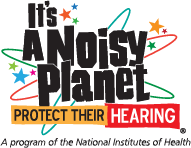We hear many types of sounds every day. While many of those sounds are safe, sounds that are too loud and last too long can permanently damage your hearing. The louder the sound, the more damage it can cause to your hearing, and the faster this damage will occur. This damage is called noise-induced hearing loss (NIHL).
NIHL may not be noticeable at first, but it can build over time, particularly when combined with hearing loss that happens as you grow older. Speech and music might start to sound muffled or distorted, making it difficult for you to understand enjoyable—and important—sounds. There is good news, though! You can protect your hearing by turning down the volume, moving away from the noise, and wearing hearing protectors, such as earplugs or earmuffs.
Is the Noise Too Loud?
Here are some rules of thumb to tell if the sounds around you are too loud:
- You find yourself speaking loudly or shouting so people an arm’s length away can hear you. (Or you have trouble hearing someone talking in a conversational volume when you’re an arm’s length away.)
- The noise hurts your ears.
- Your ears buzz or ring during the noise or after the noise goes away.
How Do You Measure Sound?
Sound intensity is measured in units called decibels (dB). The decibel scale works differently than other units like inches or ounces. An increase of 10 dB seems about twice as loud to your ears, but it’s actually 10 times more intense, or powerful! Because people can’t hear all frequencies, or pitches of sound, we often use A-weighted decibels (dBA) to describe sound intensity based on what human ears can actually hear.
How Many Decibels Are Too Loud?
The National Institute for Occupational Safety and Health (NIOSH) says that workers who are regularly exposed to sounds at or above 85 dBA are more likely to get NIHL and should wear hearing protectors. Even below 85 dBA, some workers can still get hearing damage.
You can extend this advice for everyday noises. Wear hearing protectors when noise is at or above 85 dBA. Because some people—based on genetics or other factors—may be more sensitive to NIHL at even lower decibel levels, you may want to avoid noise or wear hearing protectors even if the sound is less than 85 dBA. For instance, it is currently considered safe for most people if all the sounds you hear over the course of the day average out to be 70 dBA or lower.

Also, remember that the louder the sound, the more likely it is to damage your hearing, and the faster that damage will occur.
Noises are more likely to damage your hearing if they are:
- 85 dBA and last a few hours.
- 100 dBA and last at least 14 minutes.
- 110 dBA and last at least 2 minutes.
Many devices that children and teens use today (such as music players) create noise levels at or above 85 dBA. Fun activities such as playing musical instruments, going to concerts and sporting events, watching fireworks, and especially watching or participating in shooting sports can put you and your family at risk for hearing damage. Other loud noises such as ambulance sirens, leaf blowers, and farm equipment can also put you at risk.
How Can You Protect Your Hearing?
- Lower the volume.
Set your devices—such as music devices and televisions—to low volumes. Headphones can be 110 dBA at their maximum volume! - Move away from the noise.
The closer you are to the source of the sound, the louder it will be. Move away from loud noise to reduce the risk of damage to your hearing. At concerts and other events, stand or sit away from the speakers or the source of the sound to reduce your risk. - Wear hearing protectors.
If you can’t lower the volume or move away from the sound, wear hearing protectors, such as earplugs or earmuffs. For example, wear earplugs in loud places like movie theaters, sporting events, and workshops.
How Can You Teach Kids Healthy Hearing Habits?
- Research shows that parents and other adults are important role models for kids. You can be a good role model for hearing health by wearing hearing protectors and modeling other healthy hearing behaviors.
- Take advantage of teachable moments.
- When your child is appreciating sound—a bird chirping or a campfire crackling—remind them about how easy it is to damage their hearing and not be able to hear those subtle sounds.
- When a sound is not enjoyable—an ambulance siren or a car alarm—teach your child how to protect their hearing from hazardous noise.
- Teach your child to keep the volume at a safe level when watching TV or listening to music.
- Help to safeguard their environment by not buying noisy toys. When buying electronic devices, choose the ones that let you set healthy volume limits.
- Make it convenient to use hearing protectors. Keep earplugs and earmuffs in reach and in the places where kids will need them.
- Visit our website to sign up for our Noisy Planet newsletter and share our Have You Heard? stories with your kids.



